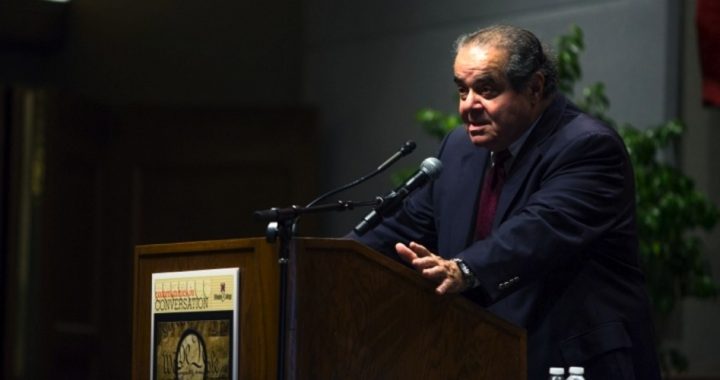
Delivering a belated Constitution Day speech at Rhodes College in Memphis on the evening of September 22, United States Supreme Court Justice Antonin Scalia was critical of High Court justices who believe the Constitution is a “living” document. In his talk, he included same-sex “marriage” among the moral and ethical questions that have nothing to do with the law. Scalia described the Supreme Court’s ruling in Obergefell v. Hodges, which requires states to allow same-sex “marriages,” as “the furthest imaginable extension of the Supreme Court doing whatever it wants.”
“Saying that the Constitution requires that practice, which is contrary to the religious beliefs of many of our citizens, I don’t know how you can get more extreme than that,” continued the High Court’s senior associate justice. “I worry about a Court that’s headed in that direction.”
Scalia has described himself in the past as an “originalist” — or believer in the concept that the Constitution should be interpreted based on what it originally meant to the people who ratified it in 1787, and has consistently defended a strict interpretation of our nation’s governing document.
“It isn’t the mindset. It’s what did the words mean to the people who ratified the Bill of Rights or who ratified the Constitution,” Scalia said in an interview with 60 Minutes’ Leslie Stahl back in 2008.
During his speech on the 22nd, which was entitled “Constitutional Interpretation,” Scalia was clear about his view of those who believe that the Constitution is a “living” document — the interpretation of which should change with the times:
[The loose interpreters are] not adhering to the text, they’re operating as policy makers. They’re not interpreting the constitution. They’re writing one, they’re revising one.
Further along in his speech, Scalia continued:
What is it that I learned at Harvard Law School that makes me peculiarly qualified to determine such profound moral and ethical questions as whether there should be a right to abortion, whether there should be same-sex marriage, whether there should be a right to suicide? It has nothing to do with the law. Even Yale law school doesn’t teach that stuff.
A report about Scalia’s speech in the Memphis Commercial Appeal cited his explanation that his arguments against Supreme Court decisions related to abortion and same-sex marriage were not based on the validity of others’ beliefs that abortion should be legal or homosexual people should be allowed to marry. Rather, they were rooted in his belief that the Constitution is not a fluid document that can be changed without the highest of standards and processes, such as an amendment.
“Do you really want your judges to rewrite the Constitution?” the Commercial Appeal quoted the justice. Scalia added that the current High Court is made up of a group of lawyers “terribly unrepresentative of our country.”
Scalia was among four dissenting justices in the Supreme Court’s Obergefell v. Hodges ruling in June that dismissed the states’ rights to decide whether or not to allow same-sex marriage. As did Chief Justice John Roberts and Justices Clarence Thomas and Samuel Alito, Scalia wrote a separate dissenting opinion, which stated, in part,
The substance of today’s decree is not of immense personal importance to me. The law can recognize as marriage whatever sexual attachments and living arrangements it wishes, and can accord them favorable civil consequences, from tax treatment to rights of inheritance.
Those civil consequences — and the public approval that conferring the name of marriage evidences — can perhaps have adverse social effects, but no more adverse than the effects of many other controversial laws. So it is not of special importance to me what the law says about marriage. It is of overwhelming importance, however, who it is that rules me. Today’s decree says that my Ruler, and the Ruler of 320 million Americans coast-to-coast, is a majority of the nine lawyers on the Supreme Court. The opinion in these cases is the furthest extension in fact — and the furthest extension one can even imagine — of the Court’s claimed power to create “liberties” that the Constitution and its Amendments neglect to mention. This practice of constitutional revision by an unelected committee of nine, always accompanied (as it is today) by extravagant praise of liberty, robs the People of the most important liberty they asserted in the Declaration of Independence and won in the Revolution of 1776: the freedom to govern themselves.
Further along in his opinion, Scalia made a significant observation:
This is a naked judicial claim to legislative — indeed, super-legislative — power; a claim fundamentally at odds with our system of government. Except as limited by a constitutional prohibition agreed to by the People, the States are free to adopt whatever laws they like, even those that offend the esteemed Justices’ “reasoned judgment.” A system of government that makes the People subordinate to a committee of nine unelected lawyers does not deserve to be called a democracy.
Neither, we might add, does it deserve to be called what it is supposed to be — a republic.
Scalia’s statement near the end of his dissenting opinion was widely quoted due to its wittiness:
The Supreme Court of the United States has descended from the disciplined legal reasoning of John Marshall and Joseph Story to the mystical aphorisms of the fortune cookie.
Rhodes College did well to select for its Constitution Day speaker one of the highest-ranking U.S. officials who is still zealously upholding the Constitution.
Photo of Justice Antonin Scalia speaking at Rhodes College in Memphis: AP Images
Related articles:
Pushback Against Supremes’ Same-sex “Marriage” Ruling Begins
Supreme Court Rubber Stamps Same-sex “Marriage” — Time for Nullification
Texas AG: “Reach of Court’s Opinion Stops at the Door of the First Amendment”
Political Leaders Voice Discontent With Supreme Court Marriage Ruling
Religious Leaders Cite Duty to Oppose High Court Marriage Ruling



